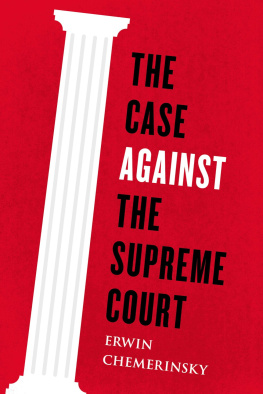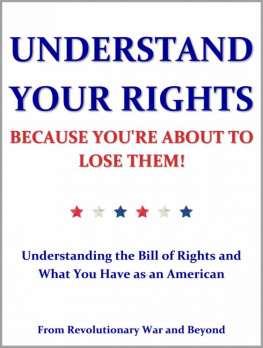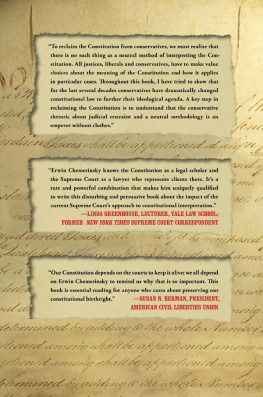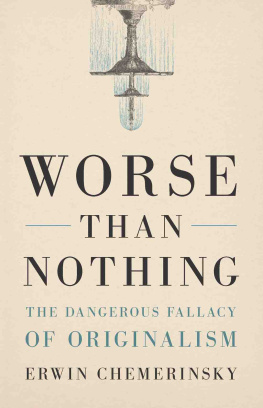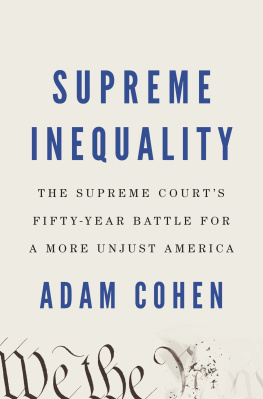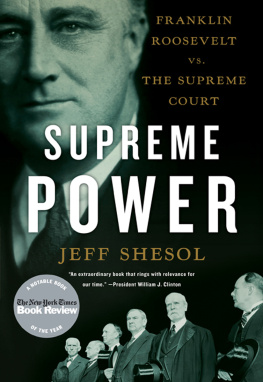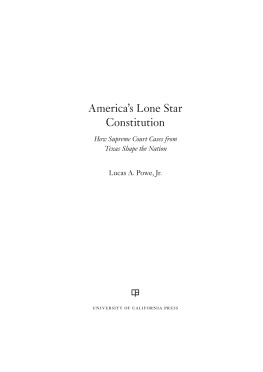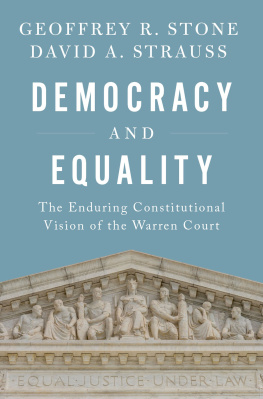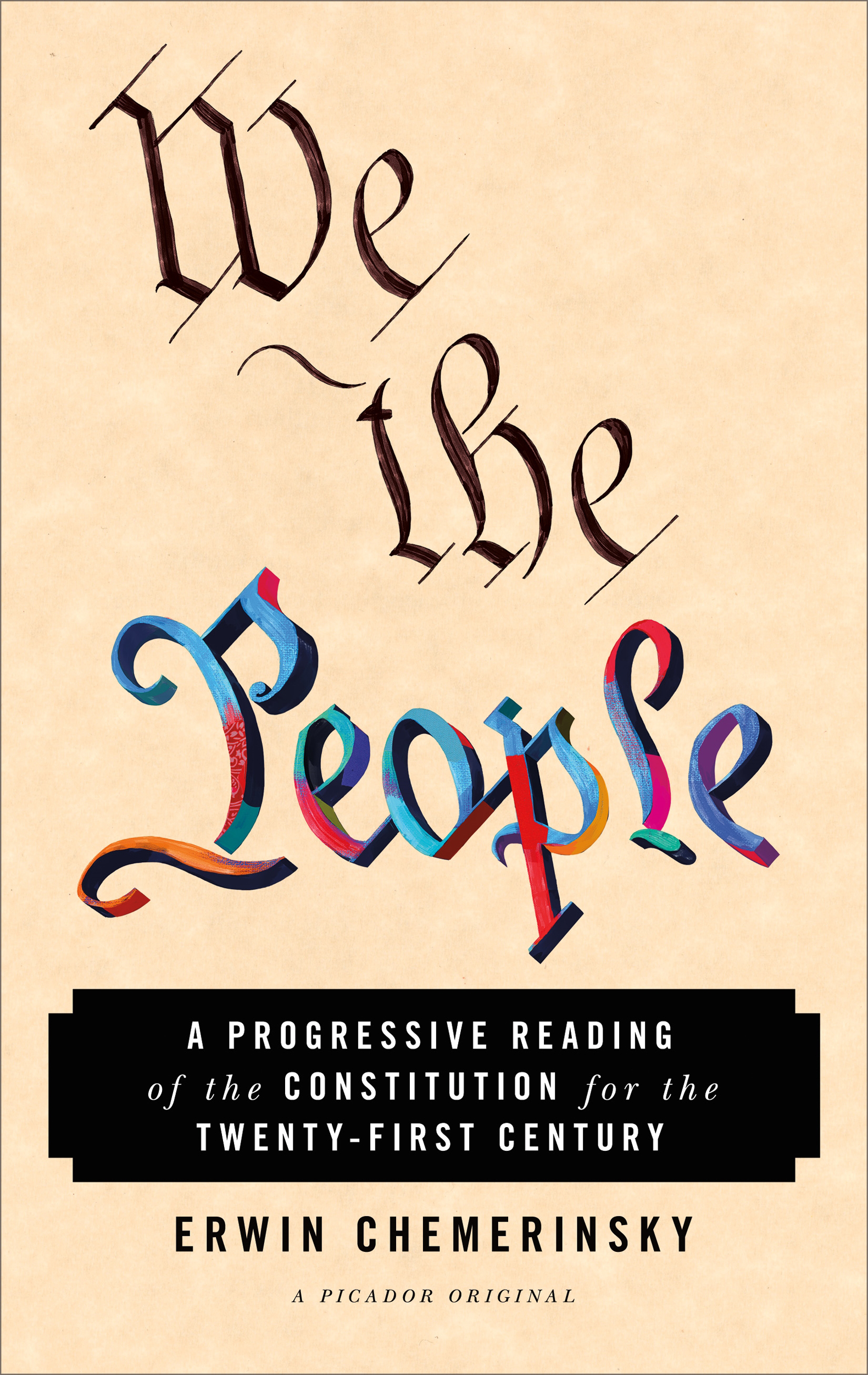Contents
Guide
Pagebreaks of the print version

The author and publisher have provided this e-book to you for your personal use only. You may not make this e-book publicly available in any way. Copyright infringement is against the law. If you believe the copy of this e-book you are reading infringes on the authors copyright, please notify the publisher at: us.macmillanusa.com/piracy.
For my grandchildren,
Andrew and Sarah:
May you live in a world where there truly is liberty and justice for all.
We the People of the United States, in Order to form a more perfect Union, establish Justice, insure domestic Tranquility, provide for the common defence, promote the general Welfare, and secure the Blessings of Liberty to ourselves and our Posterity, do ordain and establish this Constitution for the United States of America.
Like most liberals, I found the outcome of the 2016 presidential election to be devastating. I never have been so afraid for the country or the things that I believe in. I worry what the Trump administrations environmental policies will mean for the future of the planet. I fear that his xenophobic policies on immigration will be calamitous for so many peoples lives. I am concerned that his ugly rhetoric has legitimized the expression of racism in a way that has not been seen for decades. Until the white supremacist demonstration in Charlottesville in August 2017, I never had seen someone in public carrying a sign saying, KIKES BELONG IN THE OVEN. President Trump did not even condemn this, though every prior president since the 1930s has found it easy to denounce Nazism and white supremacy.
As someone who has spent his professional career teaching, writing about, and litigating about constitutional law, I am worried what the election of Donald Trump will mean for the future of the Supreme Court and the Constitution. Republican voters understood the importance of this election for the Supreme Court much more than Democrats did. Of those who voted for Trump, 56 percent said that the Supreme Court was the most important factor in their choice for president, as compared to only 41 percent of those who voted for Hillary Clinton.
For the first time since the end of the Warren Court in 1969, there will be a conservative majority on the Court for years, possibly decades, to come. The Court will become even more conservative with President Trump replacing Anthony Kennedy. Given this new reality, I feel it is imperative that liberals articulate an alternative vision of the Constitution to that being put forward by Donald Trump and the conservatives on the Supreme Court.
Conservative justices, advocates, and professors have clearly expressed their vision of the Constitution for decades. It is strongly prolaw enforcement, favoring the government and police over the constitutional rights of criminal defendants. It is powerfully pro-business, favoring the interests of corporations over those of employees and consumers. It regards race discrimination as a thing of the past and staunchly opposes race-conscious actions to remedy the legacy of discrimination and achieve diversity. It rejects the notion of separation of church and state. It strongly opposes constitutional protection of reproductive freedom for women and approves any and all restrictions on abortion rights.
We must develop and defend an alternative progressive vision for the Constitution: that is my goal in this book. I write it not in the belief that my vision will come to be the law soon but in the hope and conviction that it will someday. As Dr. Martin Luther King, Jr., often proclaimed, The arc of the moral universe is long, but it bends towards justice. Over the course of American history, there have been great gains in individual freedom and enormous advances in equality for racial minorities, women, and gays and lesbians, though obviously much remains to be done. Now we are at a moment with a president who is not committed to these values and face the reality of a Supreme Court that will likely be more hostile to them for the foreseeable future.
But this will change. Someday there will be a majority on the Court committed to using the Constitution to advance liberty and equality. For now, we must provide the foundation for their work. At the very least, we must provide an intellectual framework for opposing the regressive policies of the Trump administration and the conservatives on the Supreme Court.
Actually, focusing on the Supreme Court alone is a huge mistake. The Constitution belongs to all of usto We the People. Every elected official, at every level of government, takes an oath to uphold the Constitution: they each need to have an understanding of what that should mean. Constitutional issues constantly arise and affect all of us, often in the most important and intimate aspects of our lives, so we, too, should have informed views about the meaning of the Constitution. Each of us needs to interpret the document for ourselves in evaluating government actions, as well as court decisions.
Even though there is a Republican president and a conservative majority on the Supreme Court appointed by Republican presidents, progressives must not yield the Constitution to them. We must develop and defend and fight for a progressive vision of constitutional law. We need to fight for that vision in Congress and in state legislatures, in state courts and in federal courts, including the Supreme Court. There are sure to be losses along the way, but with careful planning and strategizing we can succeed in the long term. Most of all, we need a progressive vision of the Constitution.
This book is my attempt at articulating this progressive vision.
WHAT MIGHT HAVE BEEN
Everything changed in the Supreme Court on Saturday, February 13, 2016, when Justice Antonin Scalia died. From 1971, when President Nixon had his third and fourth nominees confirmed for the Court, until February 13, 2016, there were always at least five justices, and at times as many as eight justices, who had been appointed by a Republican president. For forty-five years, whenever the Court was ideologically divided, more often than not there were five votes for a conservative result.
But with the death of Antonin Scalia, there were suddenly only four justices appointed by Republican presidents: Chief Justice John Roberts and Justices Anthony Kennedy, Clarence Thomas, and Samuel Alito. And there were an equal number appointed by Democratic presidents: Justices Ruth Bader Ginsburg, Stephen Breyer, Sonia Sotomayor, and Elena Kagan. Although there have been times in American history where justices ideology did not correspond to the political party of the appointing president, that is not true today.
Roberts, Thomas, and Alito are very conservative. Many have a misleading impression of Roberts because he joined the liberal justices to uphold the Affordable Care Act (2010). But overall Roberts virtually always votes with his conservative colleagues, especially in the high-profile areas such as abortion rights, affirmative action, rights for criminal defendants, gay and lesbian rights, gun rights, voting rights, and religious freedom. At the same time, Ginsburg, Breyer, Sotomayor, and Kagan consistently vote in a liberal direction.
Kennedy has been the swing justice, by far the justice who votes most often in the majority. In 20162017, officially known as October Term 2016, he was in the majority in 97 percent of all the decisions. The year before, he was in the majority in 98 percent of the cases. He has been the fifth vote with the four liberal justices to strike down laws prohibiting same-sex marriage,


